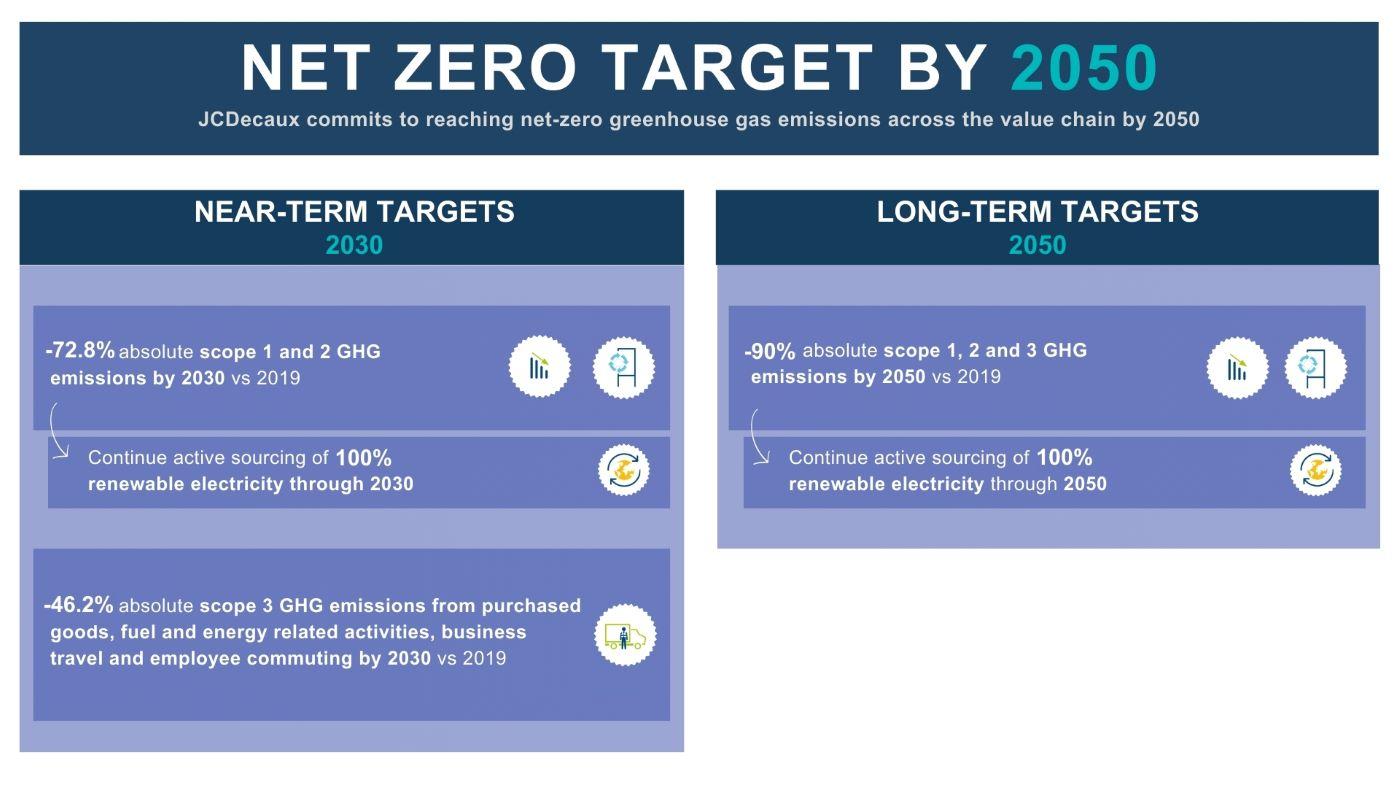JCDecaux’s Group carbon reduction trajectory approved by the SBTi

JCDecaux SE (Euronext Paris: DEC), the number one outdoor advertising company worldwide, is proud to announce that its carbon reduction trajectory has been approved by the Science Based Targets initiative (SBTi). Known as the “Corporate Net Zero norm”, this climate action organisation supports companies worldwide in their reduction of greenhouse gas (GHG) emissions and their decarbonisation via a methodology consistent with the IPCC’s recommendations. This validation, the most ambitious designation available through the SBTi process, reaffirms JCDecaux’s commitment to actively participate in the fight against climate change by adopting eco-responsible practices and promoting sustainable innovation in its business practices.
In June 2023, JCDecaux unveiled its new Climate Strategy, including targets to continue reducing its carbon footprint across its entire value chain. Based on three principles – Measure, Reduce and Contribute beyond the Group’s value chain, the strategy aims for Net Zero Carbon by 2050 (scopes 1, 2 and 3)*. To achieve this, JCDecaux defined a roadmap based on the Science-Based Targets Initiative (SBTi) that is backed up by scientific data. In late 2022, the Group signed a pledge to achieve these SBTi goals, and committed to submitting a low-carbon strategy with associated targets. This commitment was fulfilled in 2023. In June 2024, SBTi reviewed and approved JCDecaux’s carbon reduction targets.
The SBTi’s Target Validation Team has classified JCDecaux’s scope 1 and 2 near-term target ambition and has determined that it is in line with a 1.5°C trajectory. The Target Validation Team has also evaluated the Group’s scope 1, 2, and 3 long-term target ambition, and determined that it is aligned with the SBTi’s 1.5°C mitigation pathways for reaching Net Zero by 2050 or sooner. Detailed targets as follows:
- Overall Net-Zero Target:
- JCDecaux SE commits to reach net-zero GHG emissions across the value chain by 2050.
- Near-Term Targets:
- JCDecaux SE commits to reduce absolute scope 1 and 2 GHG emissions by 72.8% by 2030 from a 2019 base year1.
- JCDecaux SE also commits to continue active annual sourcing of 100% renewable electricity through to 2030.
- JCDecaux SE further commits to reduce absolute scope 3 GHG emissions from purchased goods and services, capital goods, fuel and energy related activities, business travel and employee commuting by 46.2% within the same timeframe.
- Long-Term Targets:
- JCDecaux SE commits to reduce absolute scope 1, 2 and 3 GHG emissions by 90% by 2050 from a 2019 base year2.
- JCDecaux SE also commits to continue active annual sourcing of 100% renewable electricity through to 2050.
JCDecaux’s reduction trajectory is based on internal levers as well as external factors. As scope 3 accounts for more than 90% of its carbon footprint (market based), reaching the target will be a collective journey requiring the collaboration of all its stakeholders. Since JCDecaux’s furniture footprint accounts for 42% of its scope 3 emissions, it will need to cooperate with its suppliers to offer the market even more efficient low-carbon solutions without compromising on quality. To deliver this, JCDecaux will need to focus upon even more responsible public/ private procurement based on compelling and assessed environmental and social criteria as well as partnerships with landlords.
Since its very beginning in 1964, JCDecaux has placed sustainability and efficiency at the heart of its business model. The Group created a Sustainable Development and Quality Department in 2007, set out an ambitious Sustainable Development Strategy in 2014, which was updated in 2022, and unveiled its ambitious Climate Strategy in 2023. In France, JCDecaux is contributing to the collective effort set by the public authorities, in particular by the voluntary adoption of a Climate Contract and by respecting its commitment to reducing its energy consumption by 10% in 2024 compared to 2019. JCDecaux designs, installs, and maintains light infrastructure (bus shelters, street furniture, self-cleaning public toilets, self-service bicycles, etc.) in public spaces and travel hubs thanks to the financing provided by the advertising for brands and companies displayed on that infrastructure. JCDecaux street furniture provide innovative and free services for millions of people around the world, as well as for local authorities and transport companies, based on resource-efficient management. This business model is virtuous in three ways: economically, ecologically, and socially.

Jean-Charles Decaux, Chairman of the Executive Board and Co-Chief Executive Officer of JCDecaux, said: “One year on from unveiling and starting to deploy our ambitious Climate Strategy geared towards the goal of “Net Zero Carbon”, we are very proud to achieve the validation of the SBTi after a multi-step process. Reducing our environmental footprint is one of JCDecaux’s long-standing commitments. Our virtuous business model resonates with the Green Taxonomy, as nearly 50% of our 2023 revenues are aligned with this European regulation. As the number one worldwide in our business sector, we are determined to play an active role in the collective response to the challenges of climate change and to make outdoor advertising a driver of the ecological transition. JCDecaux will continue to work with all its stakeholders and to support those involved in public and private procurement to ensure that it becomes a powerful and effective driver of sustainable development, based upon quality as well as ambitious environmental and social criteria. It is through systemic actions and by engaging our entire value chain that we will contribute to Net Zero Carbon.”
1 The target boundary includes land-related emissions and removals from bioenergy feedstocks.
2 The target boundary includes land-related emissions and removals from bioenergy feedstocks.
*
Scope 1: Direct emissions
Resulting from the manufacturing of products or the combustion of fuel for company vehicles (natural gas, oil, etc.)
Scope 2: Indirect emissions
Associated with energy consumption that does not directly pollute (electricity, etc.)
Scope 3: Other indirect emissions
Linked to the rest of the company’s activities (procurement, transport, end-of-life cycle, employee travel, etc.)
**
Market-based
Method of calculating CO2 emissions linked to electricity consumption, based on emissions factors associated with the supplier from which the company buys its electricity. Emissions are calculated on the basis of the electricity that the organisation chooses to purchase, often through negotiated contracts or instruments such as Renewable Energy Certificates (RECs).
Source: JCDecaux SE


